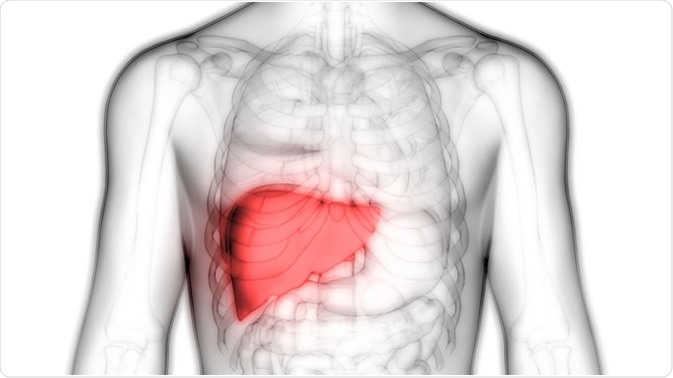Skip to:

Human Body Organs Anatomy (Liver). Illustration Credit: Magic mine / Shutterstock
A healthy and balanced diet is essential for maintaining normal liver function. Since the liver is a vital organ for digesting food and filtering toxic substances from the blood, good nutrition is particularly important for both preventing liver damage or slowing the progression of liver disease.
Why a balanced diet is important for the liver?
Food nutrients like carbohydrates, fat and protein are absorbed into the bloodstream from the gastrointestinal tract. These nutrients are then carried to the liver, which subsequently processes them to either store or use to support important physiological functions in the body.
In addition, the liver also detoxifies potentially harmful substances, for example alcohol and prevents their accumulation in the body. Thus, maintaining a healthy liver is a prerequisite for preserving overall body homeostasis.
A well-balanced diet, generally defined as a diet which is low in fat, sugar, and salt and high in fiber, is important to reduce the metabolic burden on the liver.
Choosing a diet from a wide range of foods is essential to ensure that the body is providing all essential nutrients.
In general, a balanced diet that is good for the liver should include a variety of fruits and vegetables, starchy carbohydrates (potato, rice, bread, and pasta), milk/soy drinks, beans and pulses, meat (fish and egg), and unsaturated oils.
Food items that are high in fiber are good for optimal liver functioning. In addition, consuming a lot of water/fluid is vital for preventing dehydration and maintaining normal liver function.
Interestingly, many studies have revealed beneficial effects of drinking coffee on liver health. According to the British Liver Trust report, drinking moderate amount of coffee daily can reduce the risk of liver fibrosis, cirrhosis, and liver cancer. Moreover, in patients with liver disease, consumption of coffee can reduce the progression of the disease.

Studies have revealed beneficial effects of drinking coffee on liver health. Image Credit: Baranq / Shutterstock
What should be avoided to maintain a healthy liver?
Fried/fast foods that are high in fat and sugar are extremely harmful for liver health. In addition, consumption of high-salt foods can lead to fluid-buildup and swelling in the liver.
In case of severe liver damage, the organ cannot digest proteins properly, which subsequently causes accumulation of toxic waste products in the blood. In such cases, reducing protein intake and increasing carbohydrate intake can be beneficial.
Since the liver is the main organ for alcohol detoxification, liver damage can be prevented to a greater extent by avoiding or limiting alcohol consumption to one drink/day for women and 2 drinks/day for men.
What are the dietary requirements for specific liver diseases?
If detected at an early stage, pathological liver damage can be reversed by simply adopting a healthy diet plan. There may be specific food requirement for a particular liver disease, which can potentially prevent further deterioration.
In alcohol-related fatty liver disease, patients mainly lack a B vitamin called thiamine, which is required to get energy from carbohydrates. Therefore, foods that are rich in thiamine, such as whole grains, yogurt, legumes, seafood, fish, and egg, are recommended. Moreover, a balanced diet with enough protein and carbohydrate, as well as high-energy, high-protein drinks with vitamin and mineral supplements are good for these patients.
In non-alcoholic fatty liver disease, the best measures that can be taken to reduce liver damage include
- Reduce high calorie food intake
- Increase the intake of plant-based foods (fruits and vegetables)
- Eat slow-release carbohydrates (bread and potato)
- Avoid refined sugar and foods with saturated fats (cake, chocolate, and biscuits)
- Drink 3 cups of coffee and 4 tablespoons of olive oil per day
In case of hepatitis C infection, it is important to reduce the intake of food that contain a high concentration of iron. Cooking in iron utensils should also be avoided. In addition, salt intake should be limited.
In bile duct disease, flow of the bile (a liquid that helps fat digestion) from the liver to the small intestine is restricted. This leads to improper digestion of dietary fat. Patients with this disease are recommended to use fat substitutes and kernel oil (canola, olive, corn, sunflower, peanut, flax seed oils).
In cirrhosis, the liver lacks the ability to use stored glycogen for energy. As a result, body uses muscle tissues for energy production, leading to muscle wasting and malnutrition. Therefore, cirrhosis patients are recommended to consume 25-35 Kcal and 1-1.2 gm of protein per kg body weight per day. The best way to get the energy is to have snacks every 2 to 3 hours between the meals. Suitable snacks include teacake, crackers, toast, cereal, fruits, and milk drinks. Patients are also recommended to reduce their salt intake. This can be done b intake avoiding packet/tinned foods, processed meats (ham, bacon, salami, etc.), ready-to-eat meals and sauces, salted butter/cheese, and bottled water with a high sodium content.
In Wilson’s disease, the liver cannot metabolize and remove copper from the body. Thus, it is recommended not to consume copper-rich foods, such as chocolates, nuts, mushrooms, and shellfish.
Further Reading
Last Updated: Apr 8, 2023